Book reviews
 |
 |
 |
 |
 |
 |
 |
Communism’s Philosophical Failures
Book review of The Philosophy of Communism by Joseph McFadden, Ph.D.
New York: Benziger Brothers, Inc. 1939, 345 pp.
New York: Benziger Brothers, Inc. 1939, 345 pp.
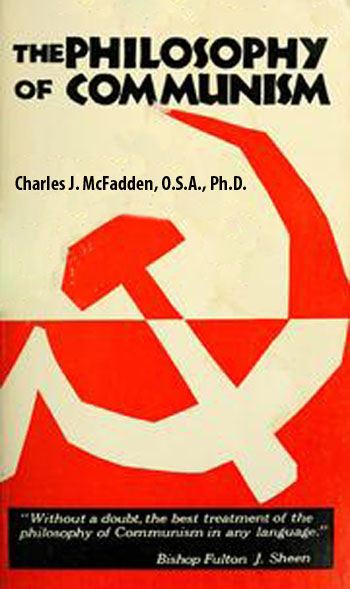
The book is intended to be read in a step-counter-step fashion. McFadden defines Marxist ideology in the first chapters and presents their systematic refutations in the latter chapters. The reader does well to read each chapter followed by its refutation, rather than in a linear start-to-finish fashion. As source material McFadden relies on the words of the communists themselves to describe their own system of thinking. It is by their own words that they are proven to be in error.
With this work one is able to understand both the allure that Marxism held over so many intellectuals, and realize that it is an inherently flawed, hypocritical and dishonest system of thinking. McFadden proves that Marxism refuses to recognize the most basic aspects of human nature, history and economics. This work will allow one to understand how so many fell prey to Marxist thought, while demonstrating the mortal flaws inherent in even its most basic tenets.
Communist originators: Marx and Engels
McFadden begins with the origin story of communist philosophy. Marxism, formally known as Dialectical Materialism, was the product of the 19th century minds of Friedrich Engels and Karl Marx. Together they set out to invent a school of thought that would reinvent the dead philosophy of materialism and offer a universal scientific explanation for History, as well as forecast the future of humanity. Marxist theory sought to be all inclusive, a philosophy that would explain every aspect of human existence from history to religion and morality.
Marxism tried to explain the workings of nature as results of the constant shock of opposites, the mind as the mere function of the material brain, and the eternal existence of matter as the only truth over the world of spirit and ideas, which it rejects. Thus, as a materialist, Marx denies that man has a soul or that a spiritual reality exists. Everything has to be quantifiable: For him there is no such thing as God.
Marxist view of History
After covering Marxism’s background McFadden goes on to demonstrate its theory. Marx viewed History as a millennia long conflict following the development of private ownership as the means of survival. Those who accumulated the means to survive forced others to labor for them, and, thus, society gradually evolved from a primitive tribalism into modern exploitative Capitalism.

A wall with communist propaganda blasting US 'imperialism'
Politics, religion and morals are all social constructs intended to support and perpetuate the exploitation of the majority by the minority. Even the State apparatus falls under this category; as property begets class, class begets class antagonism, and class antagonism necessitates that the exploiters create a State to safeguard their power.
Marxist revolution
Once the premise of class exploitation is established, it is the simple conclusion of Marx that society’s ills are primarily attributed to inequality and class antagonism. To cure society of this ill, the exploited working class must destroy the exploiter class and establish a classless society where wealth is distributed equally and everybody works for the common good. This revolution necessarily involves violence, as the ruling class will not willingly relinquish its easy lifestyle to “the common herd.”
Marx theorized that, after a transition period, man would arrive at True Communism, a stateless classless society where man is truly free from the shackles of religion, want and exploitation.
Errors of Marxism
Having presented the communist arguments, McFadden then systematically annihilates each position held by Marxism.
One of the most fundamental tenets of Communism is that the worker is entitled to the fruits of his labor. Capitalism, Marx argues, takes from the worker and returns only in the form of a small wage, enough for the workers’ subsistence. This capitalist habit of taking the wealth of labor and paying the worker only a minor portion is the basis for the communists’ critique. Only by abolishing the capitalists’ claims to such wealth, i.e. property, can societal ills be addressed.
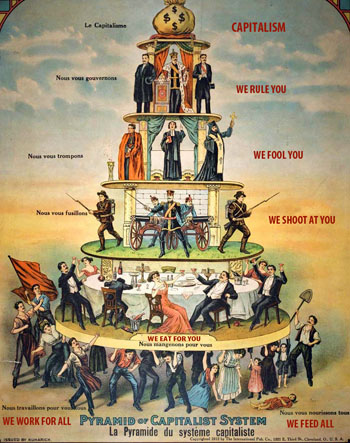
The contradictory lies spread by Communism about how the upper classes exploit the lower
Marxism does away with religion, claiming it to be a product of mankind’s fear of the forces of nature. It alleges that, once private property was established, Religion was used to defend the ruling class and perpetuate the exploitation of the workers. This view is not only refuted by modern anthropology, but is further thwarted by the fact that the Catholic Church, the religion primarily targeted by Marx and other communists, has been condemning exploitation of the poor since its inception.
McFadden demonstrates that if Marx had actually looked into History he would have seen that it has always been the Catholic Church that censured the exploitation of the poor. Catholicism condemns those who seek the disproportional accumulation of riches and has always acted as an agent to thwart the exploitation of the poorer classes. McFadden also points out that, historically speaking, it was principally the rich and powerful who sought to destroy Christianity, while Our Lord selected poor men to be His Apostles. Thus, the author finds Marx not only wrong, but in contradiction of his own professed adoration of verifiable evidence.
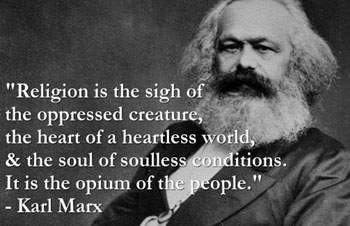
Marx' famous line: 'Religion is the opium of the people'
Furthermore, communists, on one hand, deny they preach violence, but on the other hand affirm that violence is necessary when the ruling class does not relinquish the power or resists the workers’ demands.
Corrupt human nature
Having demonstrated the contradictions inherent in communist philosophy. McFadden goes on to identify one of the most basic errors in Marx’s system. In his philosophy Marx was unable to grasp the basic fact that human nature is flawed.
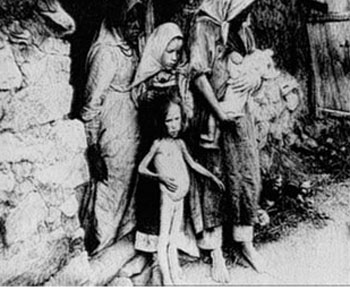
Under Communism millions of Russian peasants died of hunger in the 1920s
Marx thus idolizes the working class and concludes that since the proletariats have not had the opportunity to abuse, they are innocent of the motives that lead to abuse. This fundamental error conflates lack of opportunity with lack of motive.
Betraying his Judaic roots, Marx places his hope in the deliverance of humanity at the hands of a messiah-like proletariat free of the flaws of human nature and ready to establish a paradise on earth.
McFadden demonstrates that to refute Marx’s idealistic thinking, one need only look to the countless examples both in philosophy and history to demonstrate the universality of flawed human nature. The author concludes that so long as the Marxist denies man’s propensity to evil, he shall be forever doomed to live in the utopist dreams of his 19th century father. With such thinking, Marx not only departs from materialism, he crosses right through Idealism and arrives in the realm of Mysticism.
Conclusion
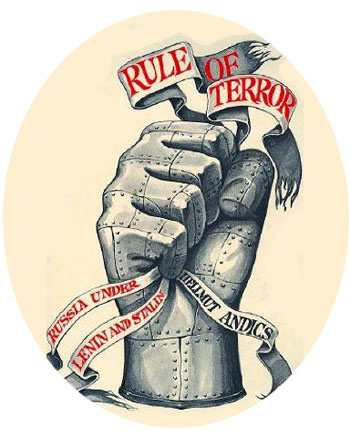
- It denied the existence of free will yet spent extravagantly on propaganda out of fear of man’s free choice.
- It abhorred capitalist exploitation whilst establishing the most grinding class slavery of the 20th century.
- It claimed to refute the world of ideals whilst idealizing a fantastical image of the working classes and utopian communist futures.
- It sought to flout Christian morality by establishing free love, easy divorce and abortion, only to backtrack in the face of population collapse.
McFadden concludes that Marxism essentially embodies its own contradiction, enslaving man in ways never before seen under capitalist enterprise.
The Philosophy of Communism demonstrates a thorough and well-researched refutation of Marxist philosophy. Anyone seeking to arm himself against communist ideologues would do well to read this book. To the student, in particular, it can prove particularly valuable as so many of today‘s universities are staffed by professors blindly advocating the specious Marxist philosophy. With this work one can fortify himself against the armies of those seduced by the mystic allure of Dialectical Materialism.

Posted September 6, 2017
______________________
______________________
 Volume I |
 Volume II |
 Volume III |
 Volume IV |
 Volume V |
 Volume VI |
 Volume VII |
 Volume VIII |
 Volume IX |
 Volume X |
 Volume XI |
 Special Edition |


